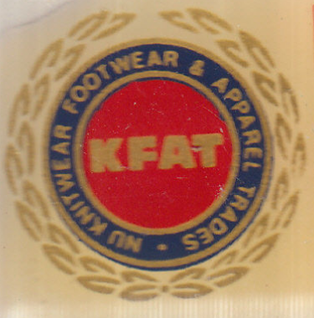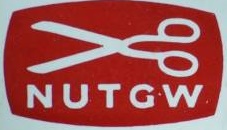Related Research Articles
In British politics, an affiliated trade union is one that is linked to the Labour Party. The party was created by the trade unions and socialist societies in 1900 as the Labour Representation Committee and the unions have retained close institutional links with it.

Adams Aliyu Oshiomhole, is a Nigerian politician and the former National Chairman of the All Progressive Congress. He had previously served as the President of Nigeria Labour Congress from 1999 to 2007 and the executive governor of Edo State, Nigeria from 2008 to 2016.
Amalgamated Clothing Workers of America (ACWA) was a United States labor union known for its support for "social unionism" and progressive political causes. Led by Sidney Hillman for its first thirty years, it helped found the Congress of Industrial Organizations. It merged with the Textile Workers Union of America (TWUA) in 1976 to form the Amalgamated Clothing and Textile Workers Union (ACTWU), which merged with the International Ladies' Garment Workers' Union in 1995 to create the Union of Needletrades, Industrial and Textile Employees (UNITE). UNITE merged in 2004 with the Hotel Employees and Restaurant Employees Union (HERE) in 2004 to create a new union known as UNITE HERE. After a bitter internal dispute in 2009, the majority of the UNITE side of the union, along with some of the disgruntled HERE locals left UNITE HERE, and formed a new union named Workers United, led by former UNITE president Bruce Raynor.

The International Textile, Garment and Leather Workers' Federation (ITGLWF) was a global union federation. In 2005 it had 217 member organizations in 110 countries, representing a combined membership of over 10 million workers.

The National Union of Knitwear, Footwear and Apparel Trades (KFAT) was a trade union in the United Kingdom.

The General Federation of Trade Unions (GFTU) is a national trade union centre in the United Kingdom. It has 35 affiliates with a membership of just over 214,000 and describes itself as the "federation for specialist unions".

The National Union of Dyers, Bleachers and Textile Workers (NUDBTW) was a trade union in the United Kingdom.

The textile and clothing industries provide a single source of growth in Bangladesh's rapidly developing economy. Exports of textiles and garments are the principal source of foreign exchange earnings. By 2002 exports of textiles, clothing, and ready-made garments (RMG) accounted for 77% of Bangladesh's total merchandise exports.

The National Union of Tailors and Garment Workers (NUTGW) was a trade union in the United Kingdom.
Clothing industry or garment industry summarizes the types of trade and industry along the production and value chain of clothing and garments, starting with the textile industry, embellishment using embroidery, via the fashion industry to apparel retailers up to trade with second-hand clothes and textile recycling. The producing sectors build upon a wealth of clothing technology some of which, like the loom, the cotton gin, and the sewing machine heralded industrialization not only of the previous textile manufacturing practices.
John Edward Newton was a British trade unionist.
The General Council of the Trades Union Congress is an elected body which is responsible for carrying out the policies agreed at the annual British Trade Union Congresses (TUC).

Bernard Sullivan was a British trade unionist and politician, who served on London County Council.
Berthold Keller was a German trade union leader.
The Italian Federation of Textile Workers was a trade union representing workers in textile manufacturing and processing in Italy.
The National Garment Workers Federation (NGWF) is a registered national trade union federation of garment workers in Bangladesh. With 87 registered factory unions, it ifs considered one of the four main federations of garment workers' unions. NGWF is the initiator and a member of the Bangladesh Garments Workers Unity Council and a member of the Bangladesh Center for Workers' Solidarity. It is affiliated with the IndustriALL Global Union and one of the signatories of the Bangladesh Accord.
The National Union of Shop and Distributive Employees (NUSDE) is a trade union representing workers in the retail and distributive industries in Nigeria.
The Swedish Clothing Workers' Union was a trade union representing workers in the garment industry in Sweden.
The Amalgamated Clothing and Textile Workers' Union of South Africa (ACTWUSA) was a trade union representing workers in the garment and fabric industries in South Africa.
The Garment and Allied Workers' Union of South Africa (GAWU) was a trade union representing clothing workers in South Africa.